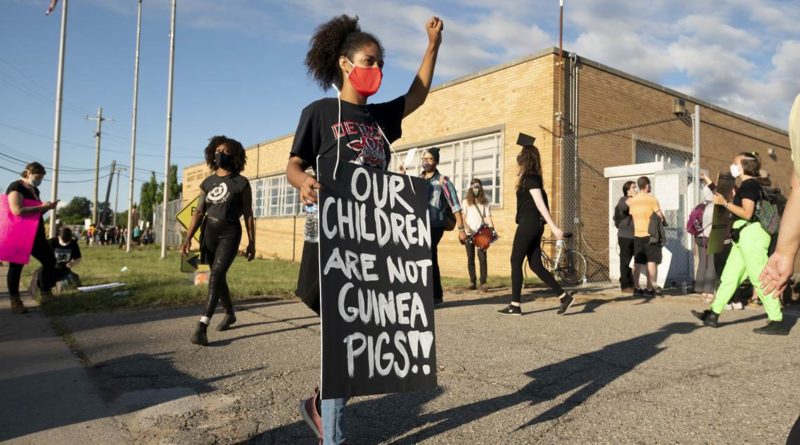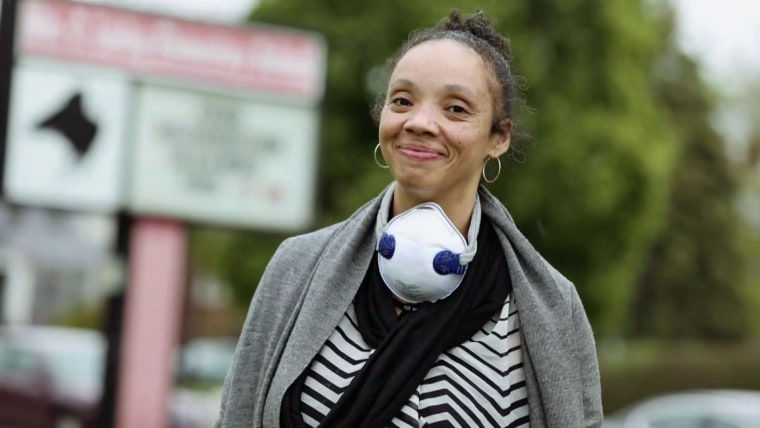In Detroit, a city hit hard by COVID-19, reopening classrooms sparks protests
DETROIT — The fury surrounding the start of summer school in Detroit this week offers a preview of the emotional battles that could hit many more communities this fall.
The city’s main public school district made the unusual decision to open classrooms for in-person summer learning starting Monday in hopes of helping children catch up four months after the coronavirus forced schools to close.
While the district says it took safety precautions to prevent the spread of the virus and stressed that no students or teachers were forced to participate in face-to-face instruction, the first two days of classes were met with protests. Activists blocked school buses from leaving a bus depot. A civil rights lawyer, who used the word “genocide” to describe the effect of the district’s decision because the student population is 96 percent Black or Latino, says she plans to seek an injunction to close the schools. The head of the city teachers union called in-person summer school a “mind-boggling decision.” And some parents expressed grave reservations about whether their children would be safe.
“I’m scared,” said Kim Martin, 50, who was picking up her son, Allyn, an eighth grader, from his summer school classes at the Brenda Scott Academy on Detroit’s east side Monday. “I don’t want my son to get sick. He’s an asthmatic.”
Full coverage of the coronavirus outbreak
Across the country, many districts are embroiled in what has become a highly politicized debate about school reopenings, with President Donald Trump threatening to withhold funding from schools that don’t offer in-person instruction. On Monday, two of the nation’s largest districts — Los Angeles and San Diego — said they will not offer in-person instruction when they reopen for the new school year because of rising COVID-19 case numbers in California.
Detroit, where roughly 500 students attended classes at 23 schools Monday, isn’t the only city to hold in-person summer school. Some districts, though, including in Connecticut and Iowa, have already had to shut down because of confirmed or suspected cases of the virus.
Evidence suggests that children are not as susceptible to the virus as adults, but some children have died, including a 5-year-old girl in Detroit. Teachers have also raised concerns about the dangers they face in returning to work.
But Detroit Schools Superintendent Nikolai Vitti said the city’s children, the vast majority of whom are classified as economically disadvantaged by the state and have test scores showing they’re far behind their peers academically, can’t afford to miss much more school.
“Our children need us,” he said. “People have to get off the sidelines and get on the field and figure out what the new normal looks like with school under COVID-19.”
He rejected critics who say the district should have stuck with online instruction, both because many children in Detroit do not have computers — a major philanthropic effort announced in April to distribute tablets or computers to every Detroit student has so far only reached high school students — and because students’ needs can’t be fully met online.
“A lot of children will not be able to stay focused and engaged and receive the support they need academically and socially, emotionally,” he said.
COVID-19 has pummeled Detroit, where 1,461 people have died from the virus since March. The school district lost about 10 employees, Vitti said, and he believes that nearly every student and staff member was affected by the virus.
While some say that’s another reason to keep classrooms closed, Vitti argues that it’s a reason to open them for students whose parents feel comfortable with the idea.
“We fill the hurt that those children and their families have,” he said.
The district is taking safety measures, including limiting class sizes to 15 students, checking temperatures of all students and staff members and cleaning all schools daily, Vitti said. Teachers have been tested for the virus, but students have not — in part because some parents said they didn’t want their children tested and in part because the district doesn’t have access to enough tests that could quickly return a result, he said.
He added that the plan was crafted in a series of virtual meetings with teachers, students, parents and district staff and was presented at two school board meetings.
Some parents said they were comfortable with the district’s measures.
“Everybody’s wearing their mask,” said Shallena Cummings, 22, who is sending her daughter Zarha, 6, to summer school at Brenda Scott so she’ll be better prepared for first grade. “My child got hand sanitizer and everything.”
Cummings had some reservations when she saw that Michigan’s case numbers have started climbing again after coming down from their peak in April.
“I was honestly about to change my mind,” she said. “But then I’m like, OK, she got to go back to school at some point. I had to get past it.”
Martin, though, remains concerned. Her uncle and a cousin died from COVID-19. She has diabetes, and as her son goes to summer school, she worries about his health, as well as the possibility that he could bring the virus home.
But Allyn needs to pass an English class so that he can advance to high school, and online classes aren’t an option because he has no computer at home, she said.
Terrence Martin, who leads the Detroit Federation of Teachers, the city teachers union, said he doesn’t see a need to put students or staff members at risk. He said the district should focus on beefing up online instruction instead, in case schools can’t open in the fall.
“There’s been a rise lately in the state. It’s just not wise,” he said. “I certainly understand the district’s response to parents saying ‘We want our kids to have an opportunity and we don’t want them to come into the next school year at a deficit.’” But he thinks online classes would be safer.
Martin signed a letter of agreement with the district about summer school after hearing from teachers who wanted summer school positions. He negotiated pay and working conditions, making sure the jobs would be voluntary.
So far, he said, he hasn’t heard any major safety complaints from his members, but he says he’ll be watching closely to see what happens — and what lessons can be learned for the fall.
Civil rights lawyer Shanta Driver, the national chair of the activist organization By Any Means Necessary, which led the protests at the bus depot Monday and Tuesday, said she planned to file suit on behalf of Detroit children Wednesday. The suit in the state’s Court of Claims, against district and state officials, would seek an injunction to force the district to close summer school.
“We can predict that some young people are going to get infected with the virus this summer because of this reopening, and everybody deserves protection from that,” she said.
She questioned why Detroit was opening schools to face-to-face instruction when most other districts in the state are offering summer school only online, if at all. She compared the decision to the infamous Tuskegee study that began in the 1930s and left hundreds of African American men with untreated syphilis for decades, saying she felt Detroit’s students were similarly being subjected to a dangerous public health experiment.
“We don’t need another racist attack against Detroit or for Detroit to be used this summer as a Tuskegee experiment to determine whether or not schools can reopen in the fall.”
Vitti said he’s not concerned about lawsuits. “We feel that we are implementing all federal and state requirements for face-to-face instruction,” he said. “We’ve gone above and beyond safety protocols and requirements and will be well prepared” to defend them in court, he said. A spokesman for the state Education Department declined to comment on the lawsuit threat.
Download the NBC News app for full coverage and alerts about the coronavirus outbreak
Driver questioned the district’s safety precautions. She connected a reporter with a school bus driver, Kenshawn Siebert, who says he reported for work at the depot where Driver was protesting Monday to discover that there were no masks or hand sanitizer for buses.
Siebert, who has driven a school bus for the city for five years, told NBC News that he was given no training for how to keep children safe on his bus. He was not tested for the virus. And after losing four friends to COVID-19 in the last few months, he said he refused to drive his route Monday and doesn’t plan to go back.
“I don’t want to see my child on a ventilator,” Siebert, a father of four, said, “and I don’t want to see somebody else’s child on a ventilator.”
Edward Flavin, a spokesman for National Express and Trinity Transportation, where Siebert worked, said all drivers completed a training, and students are required to wear masks and use hand sanitizer on buses.
“The safety, health, and well-being of our passengers and employees will remain our No. 1 priority,” he said.
Driver has been involved in civil rights and immigration issues for years but asserted that the decision to open schools this summer “is the closest thing in my lifetime that I have seen that smacks of genocide.”
The reopening, she said, “is horrifying and needs to be stopped.”






